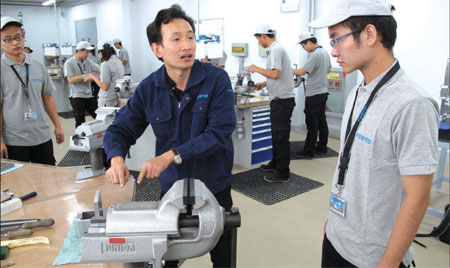Making it all work in the real world

 |
| Li Lei (center) guides apprentices at Festo. Photo by Zhang Haizhou / China Daily |
European firms take on apprentices to improve China's vocational training
Mechanical engineering student Wu Xiangbo was looking forward to his first part-time job, hoping to gain some practical experience along with the extra cash. "Ideally, I wanted some job related to my major in manufacturing," says the 22-year-old vocational training college student in Jinan, capital of Shandong province in East China.
Sadly, after several stints of job searching, Wu ended up working in a restaurant. The only hands-on experience he got was with dishes.
However, Wu was much luckier in his second year, with the experience he was desperately seeking virtually handed to him on a plate. He became one of the first of 28 apprentices at a new training center in Jinan, opened on Oct 30 by the German company Festo, a supplier of pneumatic and electrical automation technology.
In partnership with Jinan Vocational Training College, it is Festo's first full-scale training center outside Germany, and is aimed at introducing the German dual education system to China, as well as aiding the company's production in a rapidly developing Asian market.
The project reflects the challenge foreign companies, especially high-end manufacturers, face in finding sufficient numbers of skilled workers in China - despite the country boasting of having the world's largest vocational education system.
|
Wu Xiangbo talks of the practical training at Festo. Photo by Zhang Haizhou / China Daily |
This shortfall in talent has become particularly noticeable as China's economic base shifts from low-cost manufacturing, mostly for export, to high-tech industries and a bigger domestic market.
It is a huge issue, says Britta Buschfeld, head of recruitment, training and vocational training services for the Delegation of German Industry and Commerce (AHK) in Shanghai.
An AHK survey last year showed that the shortage of highly skilled workers is one of the biggest concerns German firms have in China, she says, adding that about 5,000 German companies are operating in the country.
Buschfeld says it is also a concern for Chinese firms.
"What China really needs is to raise the capability of its workers."
Giles Blackburn, a director at the China-Britain Business Council, says many British companies in the high-end manufacturing and advanced engineering sectors find it difficult to recruit skilled employees in China because of "strong competition from China's domestic enterprises" for the available talent.
"The shortage has the potential to become more severe. Multinational companies are prepared to invest in the training of workers because there is often a gap between the skills required and those provided by Chinese vocational education."
China's Education Ministry said in May that the country's vocational education system had trained more than 200 million skilled workers and technicians between 1978 and 2011. Almost 30 million students were enrolled in 14,457 vocational schools last year.
More significantly, Education Minister Yuan Guiren said China aimed to establish a "modern vocational education system" with a "global standard" by 2020.
|
||||
"We still focus too much on teaching and learning in the classroom," says Tan Hao, an education analyst based in Beijing. "This is theoretical learning but not vocational training."
Tan says it is "a remarkable progress" that most vocational schools now include internships as part of their courses, "but it's not good enough. Practical training shouldn't be just a part, but the key part of their modules. That's the best way to improve the overall ability of our graduates."
Zhou Hong, general manager of Festo (China) Production Ltd, says the company set up its own training center in Jinan mainly because it could not find enough suitably skilled people among the Chinese vocational school graduates.
In China, vocational students usually spend their first two years on campus and the final year doing internships in companies, Zhou says, adding that Festo also takes many third-year trainees.
"But after they arrive, we find these people lack systematic practical training, and so many companies can only use them as laborers. We need more time to train them, as they may make mistakes on quality control, which will cause bigger losses for companies."
Festo's training center in Jinan has started bringing in second-year students from Jinan Vocational Training College's Sino-German class, which applies a German-style system of training, with greater emphasis on practical instruction.
Today's Top News
- Xi stresses improving long-term mechanisms for cyberspace governance
- Experts share ideas on advancing human rights
- Japan PM's remarks on Taiwan send severely wrong signal
- Key steps to boost RMB's intl standing highlighted
- Sustained fight against corruption urged
- Xi calls for promotion of spirit of volunteerism

































